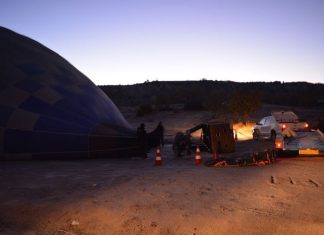We set out with the amir Tuluktumur and his brother and two sons. At every halt the Turks [let] loose their horses, oxen and camels, and drive them out to pasture at liberty, night or day, without shepherds or guardians. This is due to the severity of their laws against theft. Any person found in possession of a stolen horse is obliged to restore it with nine others; if he cannot do this, his sons are taken instead, and if he has no sons he is slaughtered like a sheep.
The food of the Turks
They do not eat bread nor any solid food, but prepare a soup with a kind of millet, and any meat they may have is cut into small pieces and cooked in this soup. Everyone is given his share in a plate with curdled milk, and they drink it, afterwards drinking curdled mares milk, which they call qumizz [kumis]. They have also a fermented drink prepared from the same grain, which they call buza [beer] and regard as lawful to drink.
It is white in colour; I tasted it once and found it bitter, so I left it alone. They regard the eating of sweetmeats as a disgrace. One day during Ramadan I presented Sultan Uzbeg with a plate of sweetmeats which one of my companions had made, but he did no more than touch them with his finger and then place it in his mouth.
Turkish horses
The horses in this country are very numerous and the price of them is negligible. A good one costs about a dinar of our money. The livelihood of the people depends on them, and they are as numerous as sheep in our country, or even more so. A single Turk will possess thousands of horses. They are exported to India in droves of six thousand or so, each merchant possessing one or two hundred of them or less or more.
For each fifty they hire a keeper, who looks after their pasturage. He rides on one of them, carrying a long stick with a rope attached to it, and when he wishes to catch any horse he gets opposite it on the horse which he is riding, throws the rope over its neck and draws it towards him, mounts it and sets the other free to pasture
On reaching Sind [in India] the horses are fed with forage, because the vegetation of Sind will not take the place of barley, and the greater part of them die or are stolen. The owners pay a duty of seven silver dinars on entering Sind and a further duty at Multan. Formerly they were taxed a quarter of the value of their imports, but Sultan Muhammad abolished this tax and ordered that Muslim merchants should pay the legal tithe and infidel merchants a tenth.
Read More about The Lay of the Two Lovers part 5








